Former president Lee Teng-hui (李登輝) yesterday said he is in favor of lowering the threshold for constitutional amendments and the voting age, and suggested that a referendum on whether the Constitution should be amended to replace the current semi-presidential system of government with a parliamentary system be staged alongside next year’s presidential election.
Lee made the remarks in a speech, titled “Constitutional reform is Taiwan’s only way out,” he delivered to the Legislative Yuan Press Club.
Calls from across party lines and from many civic groups for constitutional changes point to a rare opportunity to unite a divided public and put reform into practice, he said.
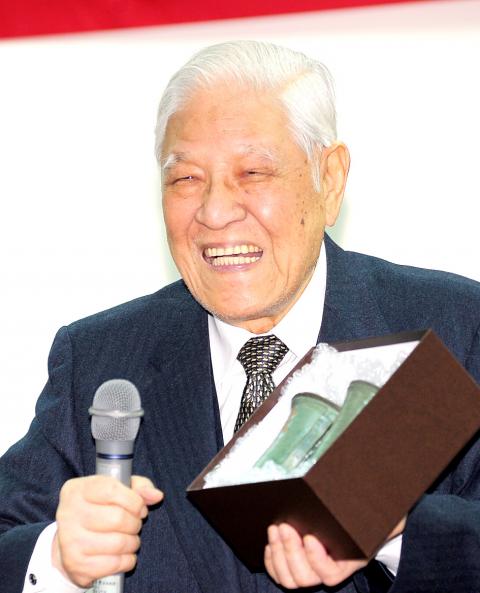
Photo: CNA
Lee proposed a two-stage reformation process. The first stage should include reducing the threshold for constitutional reform, rectifying the Referendum Act (公民投票法) and lowering the voting age to 18 — among other proposed amendments. A referendum on the draft amendments could then be held to seek public endorsement.
The current threshold for amending the Constitution requires the support of one-quarter of the Legislative Yuan to put forward an amendment, three-quarters of the legislators to attend a meeting to deliberate the proposed amendment and then three-quarters of the attendees to approve the proposal.
If approved by lawmakers, the proposed amendment must be put to a referendum, which requires half of the entire electorate to vote in favor for it to be considered passed.
In terms of changing Taiwan’s government structure, Lee said the number of Legislative Yuan seats must be increased and the legislative electoral system be overhauled, while clear lines of accountability between the president and premier must be drawn.
The president should be entitled to direct national defense and foreign affairs, including cross-strait relations, under the supervision of the legislature, Lee said.
He called for the legislators to pass draft amendments for such reforms in the first half of this year so that the proposals could then be put to a referendum next year to seek a public mandate.
The former president said he would personally facilitate talks between Chinese Nationalist Party (KMT) Chairman Eric Chu (朱立倫) and Democratic Progressive Party Chairperson Tsai Ing-wen (蔡英文) after the Lunar New Year holidays, as well as the leaders of other parties, to set out a timetable for constitutional reform.
Chu and Tsai are responsible for laying out specific claims to constitutional reform to bring about new changes, rather than taking advantage of the situation to further their political ambitions, Lee said.
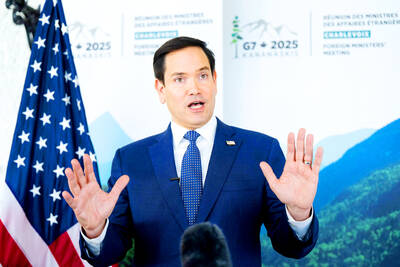
‘CROWN JEWEL’: Washington ‘can delay and deter’ Chinese President Xi Jinping’s plans for Taiwan, but it is ‘a very delicate situation there,’ the secretary of state said US President Donald Trump is opposed to any change to Taiwan’s “status quo” by force or extortion and would maintain that policy, US Secretary of State Marco Rubio told the Hugh Hewitt Show host on Wednesday. The US’ policy is to maintain Taiwan’s “status quo” and to oppose any changes in the situation by force or extortion, Rubio said. Hewitt asked Rubio about the significance of Trump earlier this month speaking with Taiwan Semiconductor Manufacturing Co (台積電) chairman C.C. Wei (魏哲家) at the White House, a meeting that Hewitt described as a “big deal.” Asked whether the meeting was an indication of the
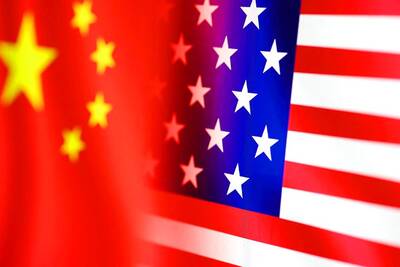
‘RELATIVELY STRONG LANGUAGE’: An expert said the state department has not softened its language on China and was ‘probably a little more Taiwan supportive’ China’s latest drills near Taiwan on Monday were “brazen and irresponsible threats,” a US Department of State spokesperson said on Tuesday, while reiterating Washington’s decades-long support of Taipei. “China cannot credibly claim to be a ‘force for stability in a turbulent world’ while issuing brazen and irresponsible threats toward Taiwan,” the unnamed spokesperson said in an e-mailed response to media queries. Washington’s enduring commitment to Taiwan will continue as it has for 45 years and the US “will continue to support Taiwan in the face of China’s military, economic, informational and diplomatic pressure campaign,” the e-mail said. “Alongside our international partners, we firmly
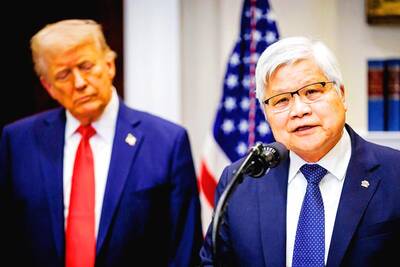
KAOHSIUNG CEREMONY: The contract chipmaker is planning to build 5 fabs in the southern city to gradually expand its 2-nanometer chip capacity Taiwan Semiconductor Manufacturing Co (TSMC, 台積電), the world’s biggest contract chipmaker, yesterday confirmed that it plans to hold a ceremony on March 31 to unveil a capacity expansion plan for its most advanced 2-nanometer chips in Kaohsiung, demonstrating its commitment to further investment at home. The ceremony is to be hosted by TSMC cochief operating officer Y.P. Chyn (秦永沛). It did not disclose whether Premier Cho Jung-tai (卓榮泰) and high-ranking government officials would attend the ceremony. More details are to be released next week, it said. The chipmaker’s latest move came after its announcement earlier this month of an additional US$100 billion
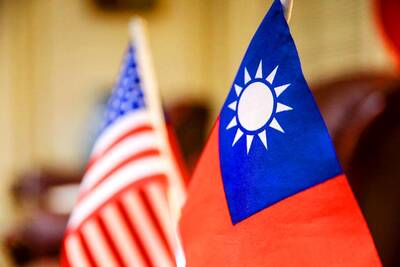
COUNTERING THE PLA: While the US should reinforce its relations with partners and allies, Taiwan must invest in strengthening its defenses as well, Phillip Davidson said If influence in the Indo-Pacific region is one of the US’ core interests, then Taiwan serves as a cornerstone of US economic and security influence in the region, former US Indo-Pacific Command commander admiral Phillip Davidson said on Thursday. “China’s ... strategy is to supplant the US leadership role in the international order ... and they’ve long said ... that they intend to do that by 2050,” Davidson told the National Review Institute’s Ideas Summit in Washington. Davidson said he had previously told US Senate hearings on China’s military activities and possible threats in the Indo-Pacific region that a Chinese invasion of